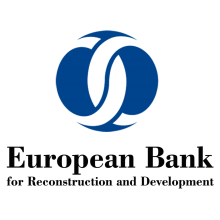
European Bank for Reconstruction and Development (EBRD)
Last updated on 03 Mar 2024
Key facts
The EBRD was founded to create a new post-Cold War era in Central and Eastern Europe, furthering progress towards 'market-oriented economies and the promotion of private and entrepreneurial initiative.
PUBLIC
1991
Credit rating (S&P)
AAA
Foreign currency
Authorizations and exposure
FY 2022 authorizations
Private sector
73%
Public sector
27%
FY 2022 authorizations
Products
- EBRD loans to private sector projects range from EUR 3 million to EUR 250 million; the average amount is EUR 25 million
- EBRD supports local commercial banks, which in turn provide loans to SMEs and municipalities. Tools that may be available include credit lines, bank-to-bank loans, standby credit facilities and equity investments in the local banks
- Basis for a loan is the expected cash flow of the project and the ability of the client to repay the loan over the agreed period
- Fixed or floating-rate: Fixed-rate basis linked to a floating rate such as LIBOR; floating-rate basis with a cap or a collar
- Senior, subordinated, mezzanine, or convertible debt
- Denominated in major foreign or local currencies
- Short- to long-term maturities up to 10 years
- Project-specific grace periods may be incorporated
- Fees:
- Front-end commission (paid upfront)
- Commitment fee (payable on the committed but undisbursed loan amount)
- Prepayment: Cancellation and late payment fees are also charged if necessary
- Other lending terms:
- Recourse to a sponsor is not required, however, the EBRD may seek specific performance and completion guarantees plus other forms of support from sponsors typically found in limited-recourse financing
- EBRD requires project companies to obtain insurance against normally insurable risks, but does not require insurance against political risk or local currency inconvertibility
- Financed companies are usually required to secure the loan with project assets
- Typical project finance covenants are required as part of the loan package
- Loan repayments are normally in equal, semi-annual installments, though longer maturities may be considered on an exceptional basis (e.g., up to 15 years for large infrastructure operations)
- EBRD can help manage financial risks associated with a project’s assets and liabilities, which covers foreign exchange risk, interest rate risk, and commodity price risk
- EBRD invests equity ranging from EUR 2 million to EUR 200 million in private sector projects; it expects a market rate return from its equity investments and only invests in minority equity positions
- Equity and quasi-equity investments include ordinary shares, preference shares, subordinated loans, redeemable preference shares, listed and unlisted, underwriting of share issues by public or privately-owned enterprises, and other forms can be discussed with EBRD banking staff
- EBRD also participates in private equity funds that focus on a specific region, country, or industry sector, have local presences, and are run by professional venture capitalists
- Guarantees:
- Letters of credit and standby letters of credit from the issuing bank
- Deferred payment and “red-clause” letters of credit
- Advance payment guarantees and bonds, and other payment guarantees
- Bills of exchange and trade-related promissory notes
- Bid bonds, performance bonds, and other contract guarantees
- Longer tenors are approved (where appropriate) to cover finance of imported capital equipment and for other term guarantees
- Other types of trade finance instruments can also be considered
- Revolving credit facility:
- EBRD can also extend short-term loans to selected banks and factoring companies
- Exclusively for the purpose of pre- and post-shipment finance and other financing of working capital necessary for the performance of foreign trade contracts and domestic and international factoring operations
- EBRD can provide financing for domestic factoring activities, in local currencies in a number of countries
- Under its Small Business Initiative, the EBRD also helps small and medium-sized businesses access the business advice they need to grow, succeed, then grow again, becoming genuine catalysts for their local economies and region
Policies
- Project must be in EBRD country of operation
- Project cannot be connected to defense-related activities, tobacco, substances banned by international law or gambling facilities
- EBRD performs extensive due diligence including:
- EBRD does not provide subsidies, sponsorship or donations
- Integrity due diligence and beneficial ownership verification
- Financial due diligence
- Market due diligence
- Management due diligence
- Technical /operational due diligence
- Legal due diligence
- Environmental and Social due diligence
- Procurement due diligence
- EBRD increased its paid-in capital by EUR 4 billion to help provide significant and sustained investment for Ukraine’s real economy
- EBRD is a climate finance leader and now aims to become a majority green bank by 2025
News
- 2024: EBRD approves membership of Ghana and Senegal
- 2024: EBRD promotes green lending under KyrSEFF III
- 2024: EBRD approves new country strategy for Uzbekistan
- 2024: EBRD deploys a record €2.1 billion in Ukraine in 2023


